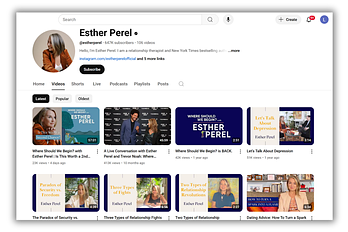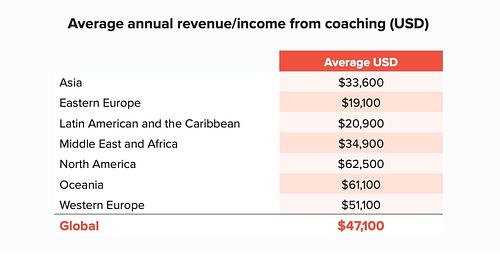March 16, 2022 - Coaching Business
Life coach salary: How much do life coaches make?
Have you ever wondered how much a life coach's salary is?

If you are at the crossroads of pivoting to a career in coaching, this is one of the most important questions you’ll probably be asking yourself.
A life coach's salary is dependent on several factors and can vary widely from coach to coach.
Knowing the average annual salary of a life coach, as well as the contributing factors, should help you get a better sense of what you can expect to earn.
It serves as a benchmark of how much you can expect to get paid for your expertise in accordance with the market rates. With a salary target in mind, coupled with your passion to help your clients, you will be motivated to pursue your career path as a full-time life coach.
In addition, if you are determined and all-in towards thriving as a life coach, then the sky’s literally the limit in terms of how much you can earn!
Once you have sharpened your skills as a coach, built a regular following, and expanded your service offerings, your income can certainly break the benchmarks.
AVERAGE LIFE COACH SALARY
It is estimated that there are 71,000 coach practitioners in 2019, an increase of 33% over the 2015 estimate.
By 2022, the coaching industry market is estimated to grow to a whopping $1 Billion.
With data provided by the 2020 ICF Global Coaching Study, let’s dive into the details.
So, what is the average life coach salary?
Coach practitioners who participated in the ICF survey had existing active clients and were asked to provide their annual income generated by coaching only. Do keep in mind that not all coaches surveyed were pursuing coaching full-time.
The table below illustrates the average annual income of a life coach, worldwide.
Source: 2020 ICF Global Coaching Study
Bear in mind that the annual salaries indicated in the table is an average of the sample of coaches who were surveyed.
The actual salary that life coaches earn is dependent on several factors, including their credentials, experience, brand name as well as the coaching niche.
“Business coaches” typically earn a higher salary than other life coaches. This is because their coaching clients are usually sponsored by their companies who foot the bill for their professional development.
Now that you know the average annual coach salaries across different geographies, you will have a better idea of how to set your life coach salary target.
HOW DO I CREATE MY IDEAL SALARY AS A LIFE COACH?
So, what goes into a life coach salary?
Lumiacoaching.com has provided a succinct list of how to create your life coach salary.
- What’s your ideal NET income?
- What are your annual business expenses? (Website, scheduling tools, software, equipment, space, insurance, etc.)
- Identify a flat tax rate based on your tax situation – 28% is a pretty conservative place to start if you’re not sure
- What’s the number of hours you want to work (be sure to think about how many holidays, “paid vacations, etc you want so you can calculate the actual number of days you intend to work per year)
-
Example:
- I want to earn $75,000 net
- I think my expenses will be around $8,000
- I'd like 10 national holidays, plus 4 weeks of vacation
- I plan to work 5 days a week, with 4 billable hours per day
-
This comes out to 230 days of work, which translates into 920 billable working hours
Now let’s plug those numbers into the formula to calculate the hourly rate you'll need to average in order to meet your net income target:
$75,000 net + $8,000 expenses + $21,000 taxes/ 920 = $113/hour
Useful, right?
Now that you have the fundamentals of how much to charge per hour of coaching, let’s explore other channels and ancillary services that life coaches can offer to expand their salaries.
HOW DO LIFE COACHES EXPAND THEIR SALARIES?
As mentioned above, there are other components that can contribute to a life coach’s salary.
When you are just starting out, you would want to focus on your core service of coaching existing clients and growing your client base by marketing yourself and building your brand name.
But, what can you do when you have built a strong client list and have a full pipe of 1:1 coaching clients?
You’re charging for your time, which is finite and obviously limits the number of 1:1 coaching sessions you can have. Thus, there is de facto a cap on how much you can earn when you charge on a ‘per hour’ basis.
Manage Your Coaching Practice in One Place
CoachVantage automates your business workflows so you can focus on impactful coaching results.
So, where do you go from there? What happens when you’ve reached the limit on the number of individual coaching clients?
How then do you break the salary benchmark and attain the ‘6-figure’ ambition?
Here are five ideas on how you can expand your coaching revenue:
1. Book speaking gigs to expand your audience
There is no better way to build credibility than to have a conversation with your audience to share your expertise, which is what a speaking gig will help you achieve.
If you’re a newbie, charges for speaking gigs can range from about $500 to $2500 for an appearance. How much you’re charging would depend on your credibility, how long you've been in your niche and service. It’s much more than you would expect to earn from a one-hour coaching session.
2. Group programs
Group programs encourage accountability between the coach and multiple coachee participants. It’s a great way for you to expand your reach, build a strong following and you could also offshoot group participants to high ticket 1:1 coaching services.
Your coaching fees for a group program can be kept low enough for an individual to join (thus eliminating the price barrier to entry), while you can benefit from the ‘multiplier’ effect and get paid more for the same time investment otherwise incurred for 1:1 coaching.
So, why not increase your impact and create a group program for individuals seeking the same outcome?
3. Build an online community through a membership site
Membership sites are the best way for you to provide your service in bulk.
Membership sites are more streamlined and allow you to service more clients over extended periods (most programs run over a year).
The setup is easier to maintain, too: you simply provide updated valuable content for clients to self-learn, in exchange for an ongoing membership fee.
Get creative with various packages, as well, depending on your members’ needs.
4. Selling info products like an online course
Over the years, you have collated a lot of information and hacks in your coaching niche. Why not package all of this information and knowledge into an online course?
It can make a great addition to your coaching business because online courses are educational in nature and low maintenance once you’ve set everything up.
By selling online courses, you could have an uncapped passive earning potential.
5. Ebooks
Ebooks are a good way for you to expand your income because it can be produced with little or no amount of investment at all, aside from your time of course.
As a life coach, you are already a master at solving problems with your expertise and content. When you package your expertise as an ebook, you gain the ability to solve those problems immediately.
Successful life coach, Valerie Burton, is a good example. When you land on her homepage, a pop-up promoting her books, “It’s About Time”, asks you whether you want the book. No mention of purchase or prices.
The one-time investment of your time to write a book will pay off over time as all you need to do is promote your book and get paid over and over every time a purchase is made.
CONCLUSION
We hope you feel more confident pivoting into your journey as a coach with the information provided above.
Bottom line:
Know your worth. Consider how much time you have invested in your expertise, what kind of certifications you have acquired and set a realistic salary that covers your expenses plus a decent margin, then work upwards from there.
CoachVantage is a coaching platform that provides coaching solutions such as scheduling, Zoom integration, branded invoices and secure client portals and so much more.
There’s also a nice dashboard that helps you track how much revenue you’ve earned from your coaching services!
Click on the button below to try it out for yourself.
You might also like...
.png)
Top Social Media Marketing Tips for Coaches that Work in 2025
.png)
Top 7 Health and Wellness Coaches That Can Aid You On Your Fitness Journey






